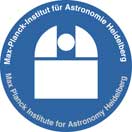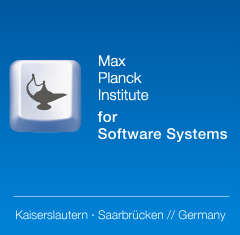Related Research Articles

Klaus Tschira was a German billionaire entrepreneur and the co-founder of the German software company SAP AG.

The Max-Planck-Institut für Astronomie is a research institute of the Max Planck Society (MPG). It is located in Heidelberg, Baden-Württemberg, Germany near the top of the Königstuhl, adjacent to the historic Landessternwarte Heidelberg-Königstuhl astronomical observatory. The institute primarily conducts basic research in the natural sciences in the field of astronomy.

Saarland University is a public research university located in Saarbrücken, the capital of the German state of Saarland. It was founded in 1948 in Homburg in co-operation with France and is organized in six faculties that cover all major fields of science. In 2007, the university was recognized as an excellence center for computer science in Germany.
The Gottfried Wilhelm Leibniz Prize, in short Leibniz Prize, is awarded by the German Research Foundation to "exceptional scientists and academics for their outstanding achievements in the field of research". Since 1986, up to ten prizes are awarded annually to individuals or research groups working at a research institution in Germany or at a German research institution abroad. It is considered the most important research award in Germany.

Peter Gruss is a German developmental biologist, president of the Okinawa Institute of Science and Technology, and the former president of the Max-Planck-Gesellschaft.

The Max Planck Institute for Software Systems (MPI-SWS) is a computer science research institute co-located in Saarbrücken and Kaiserslautern, Germany. The institute is chartered to conduct basic research in all areas related to the design, analysis, modeling, implementation and evaluation of complex software systems. Particular areas of interest include programming systems, distributed and networked systems, embedded and autonomous systems, as well as crosscutting aspects like formal modeling and analysis of software systems, security, dependability and software engineering. It joins over 80 other institutes run by the Max-Planck-Gesellschaft, which conduct world-class basic research in medicine, biology, chemistry, physics, technology and the humanities.

Gerhard Weikum is a Research Director at the Max Planck Institute for Informatics in Saarbrücken, Germany, where he is leading the databases and information systems department. His current research interests include transactional and distributed systems, self-tuning database systems, data and text integration, and the automatic construction of knowledge bases. He is one of the creators of the YAGO knowledge base. He is also the Dean of the International Max Planck Research School for Computer Science (IMPRS-CS).
The Klaus Tschira Stiftung (KTS) is a German Foundation established by the physicist Klaus Tschira in 1995 as a non-profit organization. Its primary objective is to support projects in the natural and computer sciences as well as mathematics. The KTS places strong emphasis on the public understanding in these fields. Klaus Tschira’s commitment to this objective was honored in 1999 with the "Deutscher Stifterpreis" by the German National Academic Foundation. The KTS is located at the Villa Bosch in Heidelberg, Germany, the former residence of Nobel Prize laureate for chemistry Carl Bosch (1874–1940).
Achim Richter is a German nuclear physicist. He became a professor at the Institute of Nuclear Physics at the Darmstadt University of Technology in 1974 and retired in September 2008. From 1 November 2008 to 31 October 2012 he was director of the European Centre for Theoretical Studies in Nuclear Physics and Related Areas (ECT*) in Trento, Italy. Since November 1, 2012, he has been professor again at the Institute for Nuclear Physics of TU Darmstadt.

Friedemann Mattern is a German scientist.
Wolfgang Gentner was a German experimental nuclear physicist.
Klaus Blaum is a German physicist and director at the Max Planck Institute for Nuclear Physics in Heidelberg, Germany.
The Heidelberg Institute for Theoretical Studies was established in 2010 by SAP co-founder Klaus Tschira through his foundation, the “Klaus Tschira Stiftung”, as a private, non-profit research institute. HITS conducts basic research involving the processing structuring and analysis of large amounts of data in the natural sciences, mathematics and computer science. The research topics range from molecular biology to astrophysics. Shareholders of HITS are the “HITS-Stiftung”, Heidelberg University and the Karlsruhe Institute of Technology (KIT). HITS cooperates with universities and research institutes, as well as with industrial partners. The prime external funding sources are the Federal Ministry of Education and Research, the German Research Foundation and the European Union.
Fritz Aldinger is a German materials scientist.
Theo Härder is a Professor of Computer Science at the University of Kaiserslautern.
Klaus-Robert Müller is a German computer scientist and physicist, most noted for his work in Machine Learning and Brain-Computer Interfaces.
Peter Druschel is a German computer scientist and founding director of the Max Planck Institute for Software Systems in Saarbrücken.
Bernt Schiele is a German computer scientist. He is Max Planck Director at the Max Planck Institute for Informatics and professor at Saarland University. He is known for his work in the field of computer vision and perceptual computing.

Johannes Alfred Buchmann is a German computer scientist, mathematician and professor emeritus at the department of computer science of the Technische Universität Darmstadt.
The Department of Computer Science is a department of the Technische Universität Darmstadt. With a total of 36 professorships and about 3,700 students in 12 study courses, the Department of Computer Science is the largest department of the university. The department shapes the two research profile areas "Cybersecurity (CYSEC)" and "Internet and Digitization (InDi)" of the university.
References
- ↑ "about us | EML European Media Laboratory GmbH". eml.org. Retrieved 2016-01-20.
- ↑ "Andreas Reuter says "Goodbye" - change in the HITS management". h-its.org. Retrieved 2016-01-20.
- ↑ Catherine Stiefel. "Andreas Reuter Appointed Senior Professor at Heidelberg University - Communications and Marketing - Heidelberg University". uni-heidelberg.de. Retrieved 2016-01-20.
- ↑ 2019 ACM Fellows Recognized for Far-Reaching Accomplishments that Define the Digital Age, Association for Computing Machinery, retrieved 2019-12-11